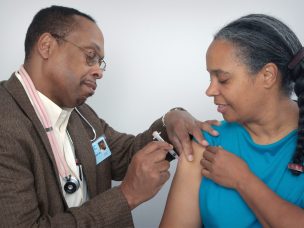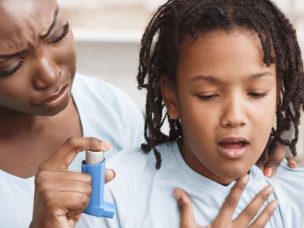Asthma
Dr. Jamie Rutland: Overcoming Asthma Disparities
In this MD Newsline exclusive interview with pulmonary and critical care physician Dr. Jamie Rutland, we discuss how asthma disparities affect Black and Brown communities. MD Newsline: Why do Black and Brown communities suffer more from asthma? Why do they have worse outcomes? Dr. Jamie Rutland: “There’s a couple of answers to that. One, I...
Biologic Therapies and Asthma Treatment Disparities
Biologics for the treatment of asthma is under investigation by multiple clinical trials. From 2003 to 2015, only one biologic was approved for the treatment of moderate to severe asthma. Since then, this research has grown, and four new asthma biologics have been developed and approved by the USFDA. Asthma harshly impacts the African American...
Advances in Nasal Morphology and Asthma Research
Due to the respiratory function of the nasal passage, it has been suggested that abnormal nasal anatomy can worsen asthma symptoms for some individuals. This effect is highly dependent on the type of nasal abnormality and the type of symptoms experienced. Research on this topic has increasingly used medical imaging modalities requiring large sample sizes,...
Race, Asthma, and COVID-19 Outcomes in Louisiana
A retrospective study led by Dr. Victoria Silver at Louisiana State University, Health Sciences Center in New Orleans analyzed how race and asthma influence COVID-19 outcomes. The study began around the time that Louisiana was deemed to have the fastest-growing COVID-19 outbreak worldwide. Dr. Silver’s work recognizes the disproportionate number of COVID-19-related deaths of Black...
The Association Between Public Housing and Childhood Asthma
A study led by Dr. Earle C. Chambers at Albert Einstein College of Medicine in Bronx, New York, analyzed how living in public housing affects childhood asthma and other chronic pediatric health conditions. Dr. Chambers’ work recognizes housing as a critical social determinant of health. The study is just one of a few studies to...
Race/Ethnicity, Insurance Type, and Childhood Asthma Disparities
A study led by Dr. Jamie M. Pinto at Jersey Shore University Medical Center in Neptune analyzed how race/ethnicity and insurance type influence health care utilization. Specifically, Dr. Pinto was interested in learning about the relationship between these demographic factors and the risk for reuse of urgent hospital-based services within a year of hospitalization. The...
Study Connects Rural Latino Children with Asthma Management
An ongoing randomized controlled trial led by Dr. Robin M. Dawson at the University of South Carolina in Columbia is studying how a communication intervention could affect asthma outcomes for rural Latino children. Specifically, Dr. Dawson is interested in how these outcomes might improve with a bilingual mobile app connecting children and their families with...
Race and Asthma Disparities Among Mexican Americans
A recent study led by Dr. Guadalupe Marquez-Velarde at Utah State University in Logan, Utah, analyzed how race affects asthma disparities among Mexican Americans. Specifically, Dr. Marquez-Velarde was interested in learning how race influences the likelihood of having an asthma diagnosis for Black and white Mexican Americans and Black and white Non-Hispanic Americans. She considers...
Home Intervention Improves Asthma in Low-Income Children
A pilot study led by researcher Alejandro Moreno-Rangel at the Texas A&M School of Public Health in McAllen, Texas, analyzed how indoor air quality (IAQ) interventions affect health. Specifically, Moreno-Rangel was interested in how these interventions might impact the health of children with asthma living in low-income communities along the U.S.-Mexico border. His study is...
More Medical News














